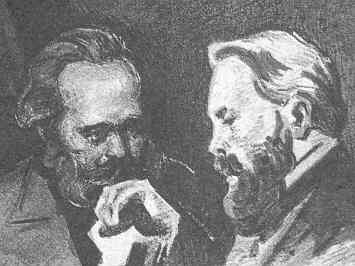Revolutions. Dedication and sacrifice. Karl and Jenny Marx
Tue May 10, 2011 12:28 pm
Exciting are the images of revolution and revolutionaries in the images of Spartacus and the armed slaves rebellion fighting and defeating the army of the Roman ruling classes' State. Thomas Munzer in Germany leading and army of armed peasants battling the trooups of landords and the princes of State and Church Oliver Cromwell's Independent Army routing the armies of the landed aristocracies and royalty, and chopping off the head of king Charles, the Parisian masses of the sans coluttes storming of the Bastile and Jean-Paul Marat in his tub writings fiery declarations and radical and articles for The Friend of the People. Harriet Tubman leading a band of armed slaves from Southern plantations to Canada and freedom. V.I. Lenin in hiding in the forest sitting on a stump writing The State and Revolution, Leon Trotsky marshalling of the Russian proletariat's Red Guard storming of the winter Palace and subsequently forming the working class into a professional Red Army or Machno's Insurrectionary Army in Ukraine, Mao tse-Tung and the band of Communist Party cadres, having escaped the Koumantang's massacres in Shanghai on the treck across the mountain's 'long march' organizing peasants into the People's Liberation Army, Che Gueverra and Castro in the Sierra Maestra fighting the Batista army and from victory to victory by gueralla warfare becoming a peasant army that would capture Havana and send Batista and the Cuban landed gentry and bourgeoisie fleaing to Miami. The Tet Offensive in Vietnam. The French workers May-June general strike. The Black Panther Party forming the Black lumpenproletariat of America's inner cities into an armed black liberation cadre. Not to worry -
Actual revolutionary processes are dedicated long term, tedious and in one word, boring work. Years of patient, tedious political work among the working classes and toiling masses becoming a determined revolutionary class requires more sacrifice than the brief moments of courage characterised in the history books.
continue...
Works of Frederick Engels 1892
Biography of Marx
Marx, Heinrich Karl, was born in Trier on May 5, 1818, the son of the
lawyer and later counsellor of justice Heinrich Marx, who, as is shown
by the baptismal certificate of his son, converted with his family
from Judaism to Protestantism in 1824. After concluding his
preparatory education at Trier Gymnasium, Karl Marx studied from 1835
in Bonn and then in Berlin, first law and later philosophy, attaining
his Dr. Phil. in Berlin in 1841 with a dissertation on the philosophy
of Epicurus. In the same year he moved to Bonn in order to qualify as
a lecturer, but the obstacles which the government laid in the path of
his friend Bruno Bauer, officially there as lecturer in theology,
which culminated in Bauer's removal from the university, soon made it
clear to him that there was no room for him at a Prussian university.
- This was the time when the younger eleements of the radical
bourgeoisie of the Rhineland, tinged with Young Hegelianism, urged, in
agreement with the liberal leaders Camphausen and Hansemann, the
publication of a big opposition paper in Cologne; Marx and Bauer were
also consulted as capable main contributors. A concession - necessary
at that time - was quietly obtained by a devious route, and the
Rheinische Zeitung appeared on January 1, 1842. Marx contributed
lengthy articles from Bonn for the new paper; foremost among these
were: a critique of proceedings in the Rhine Province Assembly, a
study of the situation of the peasant vintners on the Mosel, and
another on wood theft and the relevant legislation. In October 1842 he
took over the management of the paper and moved to Cologne. From this
point the paper adopted a sharply appositional character. But the
management was so adroit that despite first double censorship, and
then triple censorship, imposed upon the paper (first the ordinary
censor, then the Regierungspräsident, and finally a Mr. von Saint-Paul
dispatched ad hoc from Berlin), the government found this sort of
newspaper hard to deal with and therefore decided to forbid further
publication of the paper as of April 1, 1843. Marx's resignation from
the editorial board on this date bought a three months' stay of
execution, but then the paper was finally suppressed.
continue...

